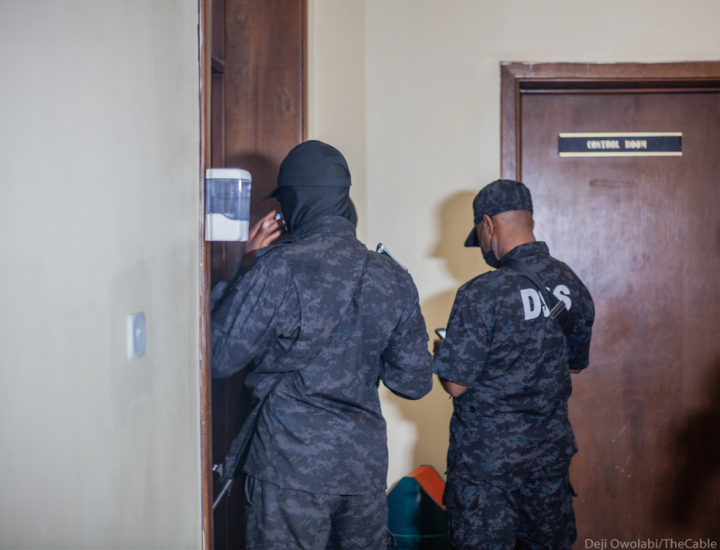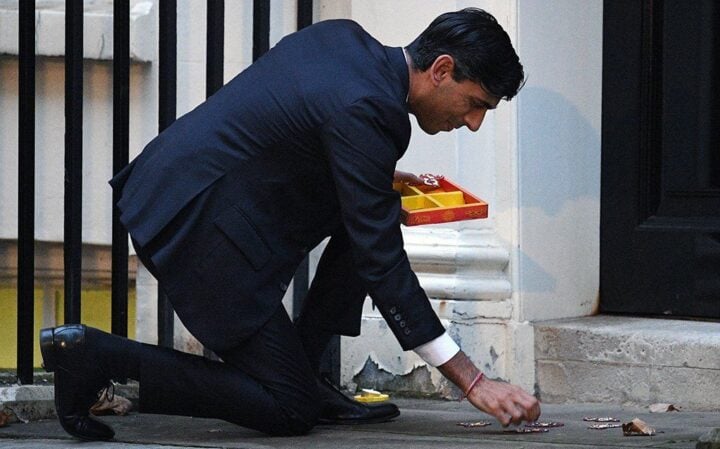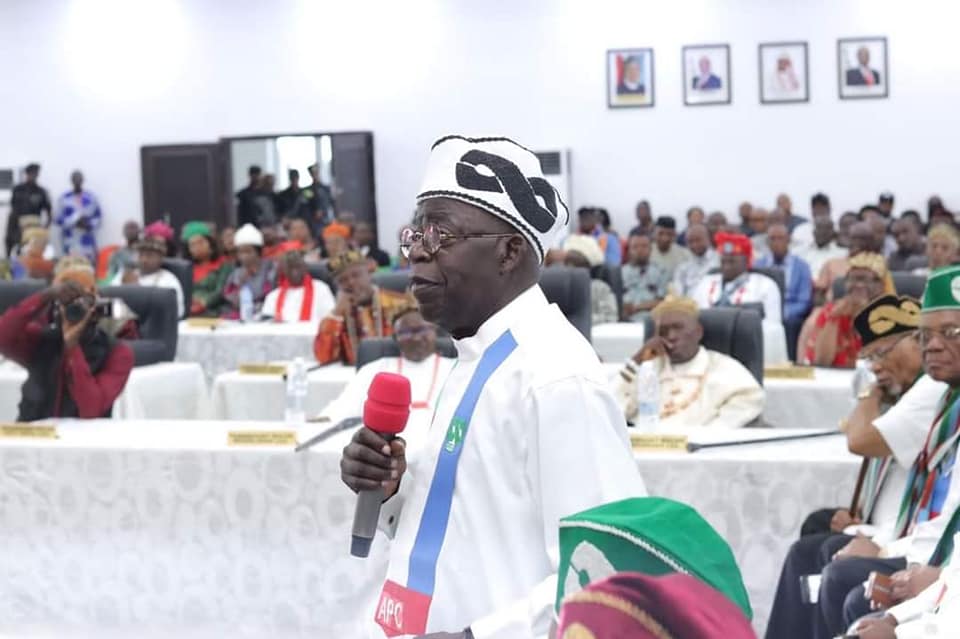File photo of DSS operatives
Some huge, evil men surround a big, black pot. It is apparent that food is being cooked. The men strung around their waists, black cloths like priests of a dreadful god. Their torsos are naked like on the day of creation. Their countenances are scary, with eyes dilating like pebbles immersed in a crimson syrup. The sweats that glide down their barrows are crimson-red too. Underneath the black pot are logs of firewood with billowing charcoal-black fumes and red flame. As one of the men heaves the lead off the black pot, the broth on fire catches the attention. It is a blackish potpourri that instantly makes an enemy of the mind and the palate. The smell oozing out of the broth is very repugnant. It is thick and heavy like the fart of a roving madman, hitting the nose like a pugilist’s blow.
The men are unperturbed by the smell. They keep fanning the fire which in turn cackles with fury. By their side sits the man who, at first glance, must have sent the hefty, unpleasant-looking men on the culinary assignment. He has the height of Goliath. Every one of his bodily features is in excessive size. He is as dark as tar, his face momentarily creasing into wry smiles as he watches the broth reach its final cooking finish. Then suddenly, another strange man appears, wearing white apparel. He moves near the heavy pot and billowing smoke. Suddenly, everything disappears; the hefty men and their Satanic paymaster. Alas, it was a mirage!
In the mind’s eye of Nigeria’s Department of State Security Service (DSS) today, the above image is Nigeria’s projected state of the polity. This DSS’ apparently concocted broth has also infected the polity. And the emerging uproar from this is massive, even unimaginable. Wherever you turn, the discussion is interim government, the Satanic plot of some unnamed persons. Some sinister men are right behind the fire. They surround it with the craving fury of a dinosaur. They are cooking the broth with magisterial determination. Their intention is to upturn Nigeria’s democratic journey. They crave the death of the All Progressives Congress (APC) like the eagle does its reptile prey. In fact, those concocting this deathly scenario are convinced that the announced victory of the APC in the February 25 presidential election has made the political party a victim of jealousy of rival political parties. This jealousy, they seem to infer, is comparable to that suffered by the proverbial Koto – valley, in the hands of Gegele – mountain. Wrapped in mortal jealousy that the downpour of the rain sidesteps it and enriches the Koto, the Gegele becomes a kvetch, inundating the world with stories of hatred against it.
All they see is the image of the military president, Ibrahim Babangida, and how he imposed an interim government on Nigeria in 1993. These elements, who are yet to be identified, cannot even stand Bola Ahmed Tinubu, the president-elect. Their gang-up is of equal, even if not more sinister content than the counsel of the biblical Ahithophel. Ahithophel, you will recall, was one of King David’s most trusted advisors. Absalom, David’s son, then plotted a rebellion against his father. He recruited Ahithophel who then starred prominently in this grisly drama, playing a leading role. Ahithophel finally defected from King David and this defection posed a mortal blow to the King of Israel.
Advertisement
Like Ahithophel, we are told that the infernal intention of those cooking the current Nigerian destructive broth is to return the country to the post-June 12, 1993, election annulment scenario. Nigerians who are old enough to connect with this narrative will be galled to their marrows. Interim government signifies uncertainty and confusion. It grabs at the throat of a country, inflicting a scenario of the bird that perches on the thin twine rope in the backyard; both the bird and the rope are gripped with tension of unimaginable proportion. Never must a people return to that Ekwensu equation. The interim government under Chief Ernest Shonekan was a terrifying time in the life of Nigeria. It was a period of weeping, wailing and gnashing of teeth.
So, how did we arrive here? After the February 25 election which was declared to have been won by the APC, the polity became charged to its boiling point. Leading political parties, the PDP and Labour Party, in concert with their loyalists, contributed immensely to the charged atmosphere. Both Atiku and Obi alleged unprecedented electoral malpractices in the poll and proceeded almost immediately to the court to challenge the declaration of Tinubu as President-elect. They levelled allegations of a sophisticated rigging of the presidential election by characters who, they claim, have perverted the courses of electoral justice through the judiciary more than anyone in history. Their argument is that Nigeria is contending with street crooks who, all their grown-up years, have cooked and fiddled with electoral figures more than an Ijaw fisherman can ever fiddle with shrimps. The same characters, they allege, are adept at all manner of illegitimate perversions and that in this instance, INEC abetted the electoral crooks.
Were Nigeria to be a country where the rule of the brawns ruled, those levelling those allegations would probably have taken laws into their hands. But because the courts are the only recognized civil arbiter in such confusion, those levelling the electoral manipulation allegations subsequently took their matters to court. This action was however not enough to reduce tensions. Protests in some parts of the country erupted, pointing to the fact that the parties that went to court were either untrusting of the judiciary or felt that there was a greater power in mob assemblage. PDP’s flag-bearer, Abubakar, in March, led one of those protests to the Abuja office of the Independent National Electoral Commission (INEC). The protesters said they rejected the result of the February 25 poll declared by the umpire.
Advertisement
In the process, allegations that the Chief Justice of Nigeria, Kayode Ariwoola, had travelled abroad to have a nocturnal parley with the president-elect began to spread like a bushfire in the height of harmattan. In my submission last week, I said that these were a cache of very incoherent allegations which have however recalibrated themselves everywhere like the metastasizing cells of cancer. Superior logic has sprouted to counter the widespread ill-logic. One said that, granted that there was such a gang-up, a physical meeting between Tinubu and Ariwoola was immaterial to pulling such treasonable chestnut from the fire. Perhaps this was one of the logic that doused and subsided the boiling passion.
Then, like the whooshing of an evening wind, the allegation of an interim government in the offing harmlessly hopped in. And characteristically, its first berthing point was social media. Its full manifestation runs thus: “There was a plan by some God-knows-who to recreate Nigeria’s 1993 unpleasant model”. As a digression, pray, why is MKO Abiola and the 1993 scenario the refrain of the people on this side of the divide and why does that model serve as a convenient harbour for them? First was “on your mandate we shall stand” and then this, which sounds like an Epetedo Declaration! Anyway, the rumour left the realm of guesswork when the DSS claimed it was privy to its authenticity. The DSS’ claim came at the same time when the voluble minister of state for labour and productivity, Festus Keyamo, raised a similar allegation. Coming in the form of a petition, Keyamo urged the DSS to invite LP’s presidential candidate, Peter Obi, and his running mate, Datti Baba-Ahmed, over their rejection of Tinubu as Nigeria’s president-elect.
Then the DSS came with some frightening counterfactuals. It alleged that some “entrenched interests” in their “mischievous way” wanted to set aside the constitution and undermine civil rule, with the aim of careering Nigeria into an avoidable crisis. “The illegality is totally unacceptable in a democracy and to the peace-loving Nigerians…The planners, in their many meetings, have weighed various options, which include, among others, to sponsor endless violent mass protests in major cities to warrant a declaration of State of Emergency. Another is to obtain frivolous court injunctions to forestall the inauguration of new executive administrations and legislative houses at the Federal and State levels,” the DSS said.
However, like the man in the white apparel who starred in the first concocted grisly drama I began this piece with, if you subject the DSS’ allegation, the uproar from the APC and the Satanic scenario they all created to the rigour of logic, you will realize that all we have since been grappling with are mirages. It is just the fertile and fictive imagination of some ghoulish-minded mind game fictionists who want to manipulate Nigerians’ emotions like a marionette. What you get after subjecting their “facts” to a session of logic is almost synonymous with prickling a massive balloon with a tiny needle. It will burst in your face. Its most fitting analogy is Shakespeare’s Macbeth’s famous quote: “Tomorrow, and tomorrow, and tomorrow, creeps in this petty pace from day to day… And all our yesterdays have lighted fools… Out, out, brief candle! (All’s) but a walking shadow, a poor player, that struts and frets his hour upon the stage, And then is heard no more. It is a tale told by an idiot, full of sound and fury, signifying nothing.”
Advertisement
First, what is the work schedule of the DSS? Is it not to arrest evil plotters? Why then make hollow hallow of people who are supposed to be sadistic characters in the market square? The global expectation is that, when you have such facts, you should not only name names with clinical precision, you should charge them to court. Second, how did all those counterfactuals propounded by the DSS amount to an interim government? At best, what the security directorate painted was public dissent, which is not illegitimate in a democratic government.
Perhaps, the DSS needs some kindergarten schooling on how interim government works. Also known by the name provisional, emergency or transitional government, it is an emergency governmental authority which is set up to manage a political transition. It is mostly applicable in newly formed states or when a collapse has been occasioned in a previous government. Members are generally appointed and, most times, arise as a result of civil or foreign wars. The provisional government maintains power pending the assumption of power by a new government. So, in what way does the Nigerian scenario resemble this? Isn’t it obvious that it is only government, never an individual, that can create an interim government?
When the crying wolf is the DSS, headed by a man who is suspected not to be an impartial security boss, people must take this directorate’s empty rhetoric with a pinch of salt. The same directorate, it was, that laid ambush for Godwin Emefiele and sought to have him locked up during the pendency of the general elections. Nigerians know whose bidding this organisation serves and who the drummer underneath the river drums for its gadfly dancing on the river top is. To invoke that empty, spidery web of national security is one of the easiest things that characters like those in the DSS do, knowing that there is no way people can put a lie to it. But logic does!
To my mind, the script being penned by those who are pushing the frenzied lie of an interim government is that of victimhood and persecution complex. When the APC and its president-elect foist the analogy that they are persistent victims of gang-ups and persecution, they evoke public sympathy. Let all eyes be fixated on the court cases instituted by both PDP and LP. They are therapeutic for the health of Nigeria’s democracy. Perhaps, falsified election results and their negative spiritual implications have been responsible for how Nigeria has wobbled on a spot this endlessly since independence. Let the ill logic of interim nonsense not detain us or instigate us into misplacing our empathy and sympathy.
Advertisement
Portable and eccentricity of stardom
In the course of my research into the work, Ayinla Omowura: Life and Times of an Apala Legend, I came to the conclusion that stardom and eccentricity are intertwined. One of my sources told me that one day in the late 1970s, Omowura, the late Yoruba musician, as a litigant in a matter that took place in an Abeokuta, Ogun State High Court, walked into the courtroom clutching a half-smoked wrap of burning marijuana. The judge was so scandalized that he shouted, “Get out of here! Where do you think you are!” apparently in deference to his stardom; otherwise, he should have been arrested forthwith.
Advertisement
Virtually all musicians parade one eccentric feature or the other. Iconic maestro, poet, philosopher and staunch defender of African rights, Winston Hubert MclnTosh, popularly known as Peter Tosh, was in this mould. Aside from his staunch belief, like many other Rastafarians, that smoking marijuana was a spiritual purification exercise, Tosh was extremely controversial and did not care whose ox was gored.
Tosh’s first major hit after separating from his friend, Bob Marley, was an atavistic album he called ‘Legalize It’ released in 1976. It uncompromisingly sang the praises of the banned narcotic called Indian hemp, lauding its alleged health benefits. Its album sleeve had him smoking marijuana chalice pipe in a countryside hemp plantation.
Advertisement
Tosh once told a 40-000-strong audience that he was not a man of peace as “peace” was “the diploma you get in the cemetery” because, on the tombstone, it is written, “Rest in Peace!” In his bassy voice, apparently encrusted by heavy ganja he smoked anywhere, unabashedly, he shouted: “Hungry people are angry people.” His memorable words landed with a thud because earlier at the concert, he had ordered camera journalists whom he labelled “lickle pirates from America… wid dem camera and dem TV business” to cease filming him.
Barely five months after, Tosh was arrested by the police. He was mercilessly beaten and in the process, his skull was cracked. He only stayed alive by feigning that he had been murdered. This probably explains the recurrence of the brutality of Babylon (the police) in his songs. In his ‘Na go a’ jail track, he banalized the criminalisation of hemp smoking and made a mockery of the system which relentlessly hounded the weed smoker. “This here smoke that you see me with, sir, I just got it from an officer; And this here little bit of green Sensimilla, I just got it from an Inspector, He’s my friend… I hear one leader say, If it wasn’t for the little Sensi, Him no know what happen to the economy; I see another leader, Go in a Half Way Tree, And he set them ganja prisoners free…” he sang, stating that even the priest smoked marijuana.
Advertisement
In one of his vinyl, Sakara music great, Yusuf Olatunji, once threw away the prudery associated with African elders. He sang that he once went to Ibadan on a musical engagement and his host dashed him a “baby” to please his soul. You would think that women were commodities to be given out as gratification of souls. On getting home, said Olatunji, he couldn’t narrate what transpired to his wife. “O se mi l’alejo o, mi o je rohin fun’yawo mi ni’le o, o fi baby kan ke mi, enu o gba’rohin nij’o ti mo de’le,” he sang.
The eccentricity of Fela Anikulapo Kuti was also largely known. From marrying 27 wives in one day, to publicly smoking weed and appearing almost naked in public. When musician, Habeeb Okikiola, popularly known as Portable, got embroiled with the law for refusing to honour police invitation, he merely fed into the troll of the eccentricity of musicians. Last Tuesday, videos of how he pelted policemen with curses after their attempt at getting him arrested for rough-handling some men of the Nigeria police hit the internet. At the expiration of the 72-hour ultimatum given him by the police, as I write this, he is said to have been locked up in a police cell at Eleweran, Abeokuta, preparatory to his arraignment in court. Police alleged that it acted based on a petition written to it by a Nigerian studio owner whose office the musician allegedly destroyed while ordering “his boys” to beat him up.
Apparently half-literate, Portable, like most of the musicians of his ilk, is alleged to romance the banned substance Rastafarians call African herb. Sometimes, he lapses into incoherence that probably speaks to some mental disconnect but the depth of his musical rendition is most times confounding.
It is gladsome that the Ogun state police spoke of how the law is no respecter of persons and thus, the need to arraign Portable in court. It must also follow it to the letter. Its public relations officer, Abimbola Oyeyemi, had said that the police believed “that you are an artiste or a star does not make you above the law… and the law is no respecter of anybody”. Those interested in fine-tuning celebrities and stars should take a deeper interest in Portable. I have written of how Brenda Fassie, a South African diva, died of drug addiction, denying her fans her great talents. The question is, can’t eccentric behaviour be divorced from artistry? My fear is that Portable stands the risk of being swallowed by the tide of his eccentricity. Like his predecessors.
Views expressed by contributors are strictly personal and not of TheCable.
Add a comment







